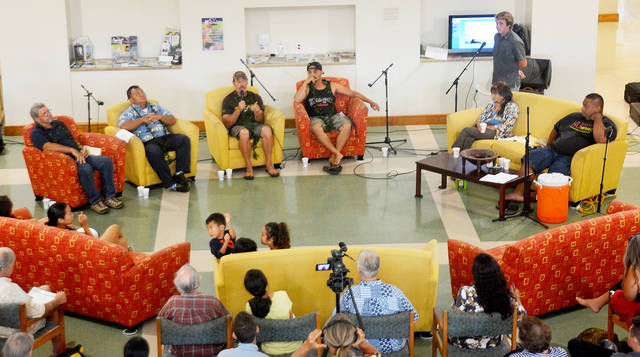PUHI — People with different perspectives on water management sat down together at Kauai Community College on Thursday to discuss the island’s resources. Broadcast by KKCR, Kauai’s community radio station, the panel discussion was between kalo farmers Adam Asquith and
PUHI — People with different perspectives on water management sat down together at Kauai Community College on Thursday to discuss the island’s resources.
Broadcast by KKCR, Kauai’s community radio station, the panel discussion was between kalo farmers Adam Asquith and Kui Palama, Jerry Ornellas, who owns Jerry’s Farm, and Mike Dahilig, Kauai County planning director.
“We’re here to have a discussion, not a debate, about how to move forward with the future of water on Kauai,” said Eric Hansen, mediator.
The discussion is part of an ongoing week of events at Kauai Community College, celebrating Earth Day, which is on April 22.
The future of water depends on who controls the resource, Asquith said, and that is what motivated him to join the discussion.
With the state recently pledging to ensure much of the diverted water will return to the Waimea River, Alison Lewis, who was attending the discussion, said Asquith’s point is a valid one.
“I want to hear about how that’s going to affect everything on the Westside,” Lewis said.
Ornellas said he understands the concern for both those who want full flow restored to all the streams and the concern of those who are using that diverted water to farm.
“I believe the days of 100 percent diversion are days of the past,” Ornellas said.
Palama said he sees water diverted from its natural flows daily around his kalo farm and the water rights activist thinks the public trust resource should be returned.
“I’m the generation to make a change,” Palama said. “I’m not going anywhere.”
As the panel tackled the conversation about water distribution on the island in front of a crowd of about 60 people, Dahilig reminded everyone that water isn’t just important for the present time.
“Water is an integral part of how we ensure that your keiki stay on the island, if there’s no water, there’s no homes,” Dahilig said.



